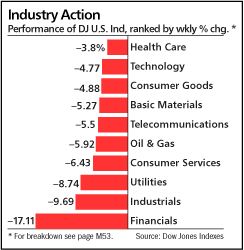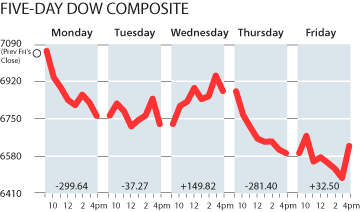Genentech Gets Its Groove Back
By JOHANNA BENNETT
AFTER MORE THAN TWO TUMULTUOUS years, shares of biotechnology giant Genentech have investors smiling again.
On Monday, the stock spiked almost 9% after U.S. regulators decided late Friday to approve Genentech's cancer drug Avastin as a treatment for advanced breast cancer, opening the door wider onto a $20 billion market for cancer therapies.
Up until then, Genentech's stock had fallen 28% since late 2005 -- when it closed at a record high $99.66 a share -- due to worries about its pipeline and key drug sales.
But some fans say Genentech could climb 20% or more in the next 12 to 18 months.
Efforts to find new markets for Avastin, already Genentech's top-selling drug, could add billions to future sales, and raise profits even faster than already expected.
"It's a reasonable multiple for this stock given the potential upside to earnings forecasts and the potential for Avastin," says Greg Dunn, an analyst with Thornburg Investment Management. "Despite the current premium, this stock looks attractive."
Some investment pros suggest waiting for a pullback before diving into the stock.
On Monday, several firms raised earnings estimates and hiked price targets. Zacks Investment Research upgraded the stock to Buy from Hold.
"We are seeing a change in sentiment towards Genentech," says Jason Kantor, an analyst with RBC Capital Markets.
Already approved for patients with colon, breast and lung cancer whose tumors have spread, Avastin is being studied as a treatment for kidney and brain tumors.
Meanwhile, Genentech and its majority shareholder, Swiss drug maker Roche, (see Weekday Trader, "Roche Offers Some Good Medicine," Feb. 13, 2008) are testing Avastin on colon, breast and lung cancer patients in the early stages of the disease.
This market could add up to $5 billion to annual revenues by 2012 and triple Avastin sales, says Eric Schmidt, an analyst with Cowen & Co.
"Avastin is a powerful tool, and if it proves to be effective in adjuvant [early stage of cancer] settings, its use will grow tremendously," says Dr. Julia Smith, director at the NYU Cancer Institute's Breast Cancer Screening and Prevention Program.
Founded in 1976, Genentech has grown into the world's second-largest biotechnology drug maker behind Amgen in sales by launching a string of novel drugs that treat blindness, asthma and cancer.
The company is something of a rarity, gaining size without relying on acquisitions.
It does, however, depend on its cancer drugs such as Avastin, Rituxan and Herceptin for 50% of revenues.
By 2009, sales of those three drugs could climb 42% to $8.3 billion, with Avastin reaching $3.7 billion, says RBC's Kantor.
Approved in 2004, Avastin was the first drug designed to starve tumors of their blood supply.
Since 2006, Genentech's new drug launches have lulled.
Genentech has 20 compounds in early-stage development, and insists that building its pipeline is its focus.
"We recognize that our success has raised the bar in terms of what our pipeline needs to look like to drive our continued growth," wrote Caroline Pecquet, a company spokeswoman, in an e-mail to Barron's Online.
For now, analysts say profits depend on finding new markets for older drugs.
Genentech expects to earn between $3.30 a share and $3.45 a share this year compared to $2.94 a share in 2007.
Rituxan has been approved as a treatment for rheumatoid arthritis. Later this year, clinical trial results are expected on lupus and multiple sclerosis.
But all eyes are fixed on Avastin.
The drug's prospects dulled last year. In December, a Food and Drug Administration advisory panel voted 5-4 against recommending Avastin as a breast cancer treatment saying it did not significantly prolong survival.
A study by Roche released Feb. 12 confirmed Avastin slowed cancer's march. And the FDA granted "accelerated approval" pending two studies expected later this year.
Meanwhile, a study testing Avastin on early-stage colon cancer patients is expected in late 2009, though data could get released sooner.
To be sure, Genentech's stock looks expensive by some standards.
At 22.4 times projected profits over the next four quarters, the shares trade at a 60% premium to the Standard & Poor's 500, according to Thomson Financial.
Still, the stock trades well below its five-year median. And the multiple has shrunk since Barron's Online wrote about Genentech in 2006, (see Weekday Trader, "Genentech Crowds the Medicine Cabinet," Oct. 18, 2006).
Genentech has "placed a lot of eggs in one or two baskets," says Steve Silver, an analyst with Standard & Poor's.
If Avastin sales falter or clinical trials fail, the stock will surely fall.
Big Pharma companies are challenging Genentech's cancer drugs. The company could lose royalty revenues if it fails to win an appeal of a recent patent decision.
Still, Genentech has a history of delivering and growing profits, and sits on $6.1 billion in cash and investments.
So as long as doctors use Avastin on more patients, it may be worth paying up for potent returns.
Subscribe to:
Post Comments (Atom)


No comments:
Post a Comment